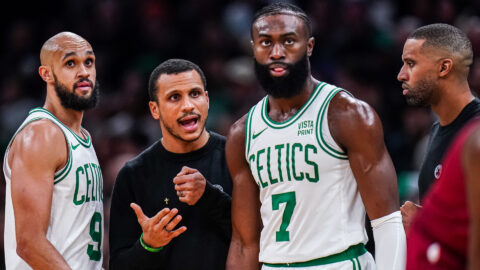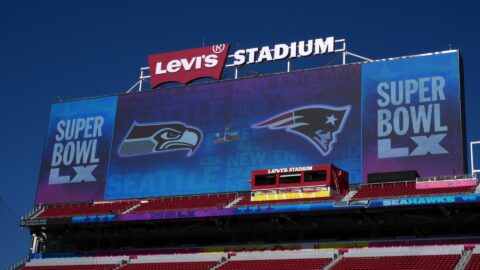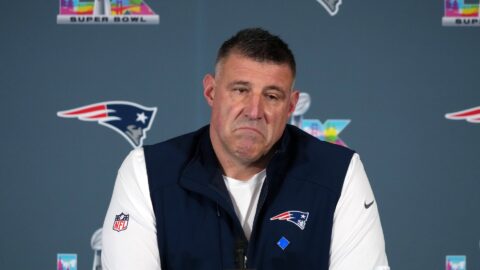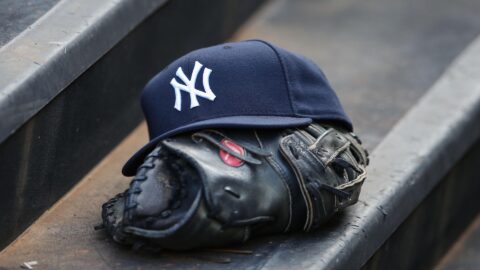Most Boston fans will give you one of three reasons for the Celtics' collapse in the Eastern Conference semifinals against the Miami Heat.
1. No Kendrick Perkins.
2. Lack of defense and rebounding in the low post (Shaquille O'Neal was injured, Nenad Krstic doesn't speak defense, and Glen Davis was a Big Baby).
3. Age.
With just six players currently under contract for the 2011-12 season, Danny Ainge can tackle all three, and the problems begin in the low post.
Good move or not, the Celtics were undeniably worse after trading Perkins, Semih Erden and Nate Robinson midseason. No one could have predicted that Shaq and Jermaine O'Neal would sit out large portions of the season with injuries, and it effectively doomed the C's against the Heat. They were out-rebounded 202-174, outscored in the paint and out-blocked. Anything involving big men, the Celtics were on the losing end of the equation.
Yes, Ainge has already added power forward/center JaJuan Johnson in the draft, but it's going to take more than a skinny rookie to shore up the paint. Below are some options.
Glen Davis
Pros: Big Baby is a career Celtic whose numbers have improved steadily every year in the league, including regular-season bests in 2010-11 of 11.7 points, 5.5 rebounds and one steal. He already knows Doc Rivers' complex defensive system and has proven himself willing to sacrifice for the team — leading the NBA in charges drawn, at one point taking 16 of them in 10 games.
Cons: Big Baby is an unrestricted free agent, meaning he can go wherever he wants. That could pose a problem for Boston, which is already on the hook for $64.2 million, well over the projected salary cap for 2011-12 — and that's if they don't sign Jeff Green. Depending on how the new collective bargaining agreement shakes out, the Celtics should still own Bird rights over Davis, allowing them to spend what they want to keep him. But just how deep into their pockets will Wyc Grousbeck and friends be willing to dig for a guy who sputtered so obviously in the 2011 postseason?
If Davis' asking price is much higher than the $3 million he earned in 2010-11, Boston's front office will have a very tricky decision on their hands.
Alexis Ajinca
Pros: The 23-year-old Frenchman is a true 7-foot-2 center who has the young legs needed to fill in for the aging and injury-prone O'Neal. And unlike J.O., and most big men for that matter, Ajinca can shoot from deep. He took at least one a game this past season with Toronto, and hit a third of them. Boston has been on the hunt for more 3-point-shooting to help spread the floor.
Cons: Ajinca's affinity for the 3-pointer betrays a related dislike for banging in the paint. That doesn't exactly mesh with the Boston way.
Kwame Brown
Pros: The former No. 1 overall pick has shown upside in recent years, logging one of his best years yet in 2010-11 in Charlotte — 7.9 points on 52 percent shooting and 6.8 boards. And the Celtics could use that 270-pound frame to throw around in the paint.
Cons: Like Shaq, Brown is a shaky pick-and-roll defender, and it might be asking too much of Kevin Garnett this year to keep bailing him out on bad rotations. After a solid year with the Bobcats, the 29-year-old's asking price might also be a bit too high, especially given that all the the Celtics likely have to offer him is the veteran minimum.
Kurt Thomas
Pros: Tough guy with a lot of playoff experience who would undoubtedly jive with the Celtics' defensive style. Thomas' rebounding prowess (he pulled in 22 percent of available defensive rebounds for the Bulls this past season, according to Basketball-Reference.com) would shore up one of Boston's major weaknesses, and given his age, the 15-season journeyman might be willing to sign the veteran minimum.
Cons: He's 85 years old, and the Celtics are trying to get younger and more athletic. At 6-foot-9, moreover, Thomas isn't exactly a defensive stopper.
DeAndre Jordan
Pros: The Los Angeles Clipper is a freak athlete who would immediately add rebounding and defense to the Boston post — and that's where Jordan lives. He shot a ridiculous 69 percent from the field in 2010-11, because largely every shot he took was a dunk. It led to career highs in points (7.1), rebounds (7.2) and blocks (1.8) and had a lot of scouts licking their chops at the 22-year-old.
Cons: There's a reason the guy dunks so often: He can't shoot. The Texas A&M alum is just 41 percent from the free throw line on his career. And it'd take quite the chase for the Celtics to land Jordan. L.A. has already extended a qualifying offer to keep him restricted, and Boston would likely have to use its mid-level exception (assuming that remains in the new CBA). Even that might not be enough.
Samuel Dalembert
Pros: The Haitian is certainly the most talented of these options. He's a rangy offensive weapon who can also serve as a shot-stopper in the paint. Like Thomas, he's a rebounding machine, grabbing 27 percent of available defensive rebounds for the Sacramento Kings in 2010-11.
Cons: After a payday of $13.4 million this past season, the mid-level exception might not be rich enough for the 30-year-old's taste.



